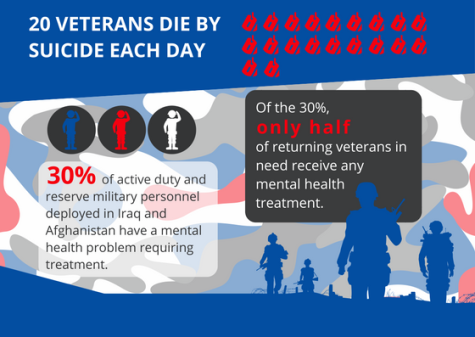Veterans’ Mental Health
According to a report published by the United States Department of Veterans Affairs (VA) in 2016, an average of 20 veterans die from suicide every day. That is a serious issue and it does not appear to be going away. Data from the VA shows that 30 percent of active duty and reserve personnel deployed in Iraq and Afghanistan have a mental health problem requiring treatment. Of these 30% only half of returning veterans in need receive any mental health treatment from the VA, which is the executive department responsible for providing life-long healthcare services to eligible military veterans. Unfortunately, this agency has been devastated by various issues for years. The VA has faced reports of excessive and contradictory spending, allegations of inadequate health care, massive backlogs of benefits claims, and an untenable position for senior leadership.

Why is the care of our veterans an important issue? These brave citizens have earned our appreciation and affection because of the sacrifice that they have made for us. Without our armed forces, the United States of America would be unable to protect the freedoms and rights of its citizens throughout our great nation. This critical duty is the most important role of our nation’s government: to protect the life and liberty of American citizens. And yet, we are continually distracted by more trivial endeavors. Oftentimes, veterans do not get the respect and love that they deserve after returning home from combat. Our nation’s veterans are often ignored and disregarded and this has occurred for decades. A classic example of the unwelcome return for American veterans was after the Vietnam War. Approximately 2.7 million American men and women served in Vietnam, 58,000 of which died. When they returned, America failed to welcome its veterans back as heroes—a terrible occurrence, as our troops suffered because of unpopular decisions by political leaders. The situation has improved since then, but there is still a long way to go and many challenges exist in the way of achieving proper respect and appreciation for veterans.
Physical injuries are often obvious and rather diagnosable. Conversely, mental illnesses are less noticeable and are often recognized only much later. According to the Catholic Health Association of the United States, “Unlike missing arms and legs, emotional and spiritual injuries can be hidden or minimized by veterans and their families. They can also be ignored or passed over by health care providers.” When veterans are missing limbs, the issue is quickly diagnosed and established treatment plans are enacted. Veterans are cheered on with each physical therapy session they attend, or as they master the use of new prostheses. When they return from combat and struggle to re-assimilate into civil society because of the guilt that they feel, however, the next steps are often much less clear. These injuries can be locked in their minds, without any outlet to release the frustration. Even though these mental injuries may be less obvious, they can cause serious issues. The three most common mental health concerns for veterans are Post-Traumatic Stress Disorder (PTSD), depression, and Traumatic Brain Injury (TBI). These illnesses are caused by the frightening experiences that veterans endure. They can be the result of physical injuries such as trauma, combat exposure, service injuries, or they can come from mental assaults such as the pressure of keeping yourself and others safe. Without therapy and a strong support group, veterans may feel lonely, lost, or hopeless when they encounter challenges in civil life. Many veterans end up homeless, unemployed, and poor. While these are sad conditions in any setting, it is particularly depressing to know that the very people who risked their lives for us are now suffering when they have returned to civilian life. Our veterans fall into these unfortunate cycles because they have not received sufficient mental care needed to address the issues they faced while serving. Life back in America can be very difficult for veterans who suffer from mental illness.
America’s veterans need our help, and there are plenty of ways that we can improve their situation. Supporting your local centers for veterans with donations of food and clothes is helpful, no doubt, but we can provide an even greater service with the simple investment of our time. Volunteering at veterans’ centers is a great way to make a difference in the lives of these brave people who have served our nation. As simple a task as sitting down and having a conversation with a veteran can contribute such an impact. One of the greatest services that we can provide is giving these veterans someone to talk to, someone who will listen. Oftentimes, a discussion can be therapeutic for a suffering person, and you will find that you will feel better, as well, after helping out a veteran. We can make a difference in the lives of the men and women who have served our nation, even if all we can change is the small things.